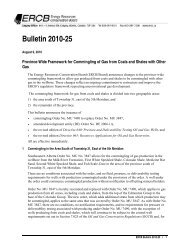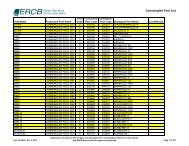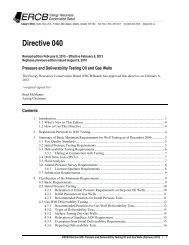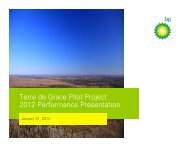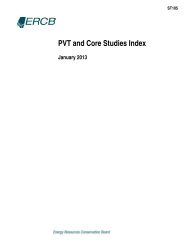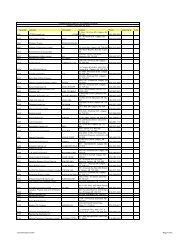Directive 065 - Energy Resources Conservation Board
Directive 065 - Energy Resources Conservation Board
Directive 065 - Energy Resources Conservation Board
Create successful ePaper yourself
Turn your PDF publications into a flip-book with our unique Google optimized e-Paper software.
1.4 Application for a Common Processor Order<br />
1.4.1 Background<br />
The Oil and Gas <strong>Conservation</strong> Act (OGCA) affords each owner the opportunity of obtaining<br />
its share of the production of oil or gas from any pool and provides for economic, orderly,<br />
and efficient development in the public interest. Accordingly, the ERCB may issue a<br />
declaration of a common processor of gas under Section 53 of the OGCA.<br />
1.4.2 When to Make This Application<br />
A typical situation that would warrant the filing of a common processor application with the<br />
ERCB would be when an owner of a capable well has a market for its gas requiring<br />
processing to meet contract specifications. The owner believes that using the existing plant is<br />
the only economically feasible or most practical way to process the gas in question or is<br />
clearly superior environmentally, but the owner has been unsuccessful in negotiations to gain<br />
access to the plant on reasonable terms. The owner has recourse to apply for the declaration<br />
of a common processor in order to gain access to the plant and allow it to obtain its share of<br />
gas from the pool.<br />
1.4.3 Terms of Application<br />
An order under this section obliges each common processor, among other things, to process<br />
gas that may be made available for processing in the plant without discrimination in favour of<br />
one producer or owner as against another in the pool.<br />
Under Section 56 of the OGCA, an applicant filing a common processor application has the<br />
option of requesting that the common processor order be effective retroactively to the date of<br />
the application. The ERCB considers such a request in light of the particular situation and has<br />
the discretion to grant the request, deny it, or provide some measure of retroactivity other<br />
than that requested.<br />
In order to give effect to a common processor order, an applicant filing a request for the<br />
declaration of a common processor also has the option of requesting that the ERCB direct<br />
• the proportion of production to be processed by the common processor from each<br />
producer or owner in the pool (Section 53(5)(a)), and/or<br />
• the total amount of gas to be processed by the common processor from the pool subject to<br />
the common processor declaration (Section 53(5)(b)).<br />
If there is a dispute as to the tariff to be paid to the common processor, either the common<br />
processor or an owner may also apply under Section 55(2) of the OGCA for the ERCB to set<br />
the price.<br />
An applicant may choose to file an application for the ERCB to set fees at the same time as it<br />
files an application under Section 53. However, in most cases where the ERCB is prepared to<br />
grant a common processor order, the application for the setting of tariffs may be deferred to<br />
allow for additional negotiations.<br />
Usually it would not be necessary for an applicant making a request under Section 53(1) for<br />
the declaration of a common processor to also make requests under each of Sections 53(5)(a),<br />
48(5)(b), 55(2), and 56, although each option is available if there is a dispute on each issue.<br />
For example, an application for the declaration of a common processor under Section 53(1)<br />
ERCB <strong>Directive</strong> <strong>065</strong>: <strong>Resources</strong> Applications / Common Processor (March 2012) • 1-21



